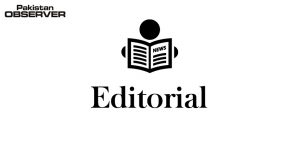Rameez A Mahesar
MORE than 820 million people globally are still suffering from hunger. To cope with no hunger by 2030 is one of the targets of UN Sustainable Development Goals. To that end, this would be “an immense challenge”. Says a report “The State of Food Security and Nutrition in the World” developed by the UN Food and Agriculture Organization (FAO) and other UN agencies comprising the World Health Organization. The number of people with insufficient food to eat has increased for the third consecutive year – this is alarming, as it is the first time in a decade that the statistics of people suffering from hunger has increased – as the population grows, after a couple of years when an actual improvement was seen. But the global agencies had firmly hoped that it would fall.
Hunger is noticed on the rise and, therefore, millions of children are not getting the nutrition they need. It is growing in the countries wherein economic growth is lagging behind and there is income inequality in the bargain. As far as the growth in children by dint of hunger is concerned, report shows that around 149 million children are currently suffering from hunger that indubitably hinders their growth.
Many countries, thus, have not avouched sustained growth as an aspect of this new economy. The world economy at all is not growing as much as hoped. The report ends with a splendid solution; we cannot put an end in the way of hunger and malnutrition by 2030, until we combat all the elements that affect global food security. The war against hunger has been one of the bright marks for progress aid strategies for a couple of decades. Some quarters have rightly grieved that it is a disgraceful failure of international institutions and our leaders as well. The improvement that we put ourselves at pains to see around these past decades has been compromised.
The issue of hunger in Pakistan is serious as Global Health Index (GHI) has underlined. It has developed last year the list of 119 countries to determine the level of hunger concern. Pakistan stands at 106th out of 119 qualifying countries – with a score of early 33 per cent. And Afghanistan is in par at 107. That means the concern of hunger in Pakistan is serious. Almost exactly Pakistan in 2016 was ranked to be 107th out of 118 developing countries on the Global Hunger Index (GHI) with a score of 33.4. Also the country, recorded last year an abysmal score of 32.6, which leaves it a scanty 2.4 points margin far-off the “alarming” zone. The country – Pakistan – is subject to agriculture that is put in the list as the 26th largest world economy with regard to purchasing power and the country is one of the world’s leading exporter of agricultural products.
Even though the country is blessed to be the third highest global producer and exporter of chickpea; fourth highest of mango and rice; fifth highest of sugarcane, date palm and milk; sixth highest of apricot and citrus; and seventh highest of onion and wheat, people are still fallen victims to deficiency. According to the World Food Programme (WFP), Pakistan yields enough food to feed its entire population, and still, six out of 10 Pakistanis are food anxious. It is high time to bring about reforms in agriculture. The wheat and rice production is massive but the questions are; where does it go and who store them? These are mafias or pressure groups, no doubt. The mafia of different sorts need to be harnessed now.
The cross-sectoral and close inter-ministerial and cooperation among the different ministries like of Water, of Health, of Climate Change and of Food Security, and a strong coalition with civil society is also needed. Not only the government but also people should pledge to fill fed every Pakistani. The question is; it is the responsibility of the government bodies to tackle this gruesome pitfall then why should the hard nut be cracked from general public? Simply, the blame turns finger not only towards the state machinery and government per se, but also towards the media, that doesn’t cover the news of such a fatal concern as much as it should be, and, also pointedly, with ourselves.
— The writer is Researcher at JRIDSS, SBBU-SBA.










